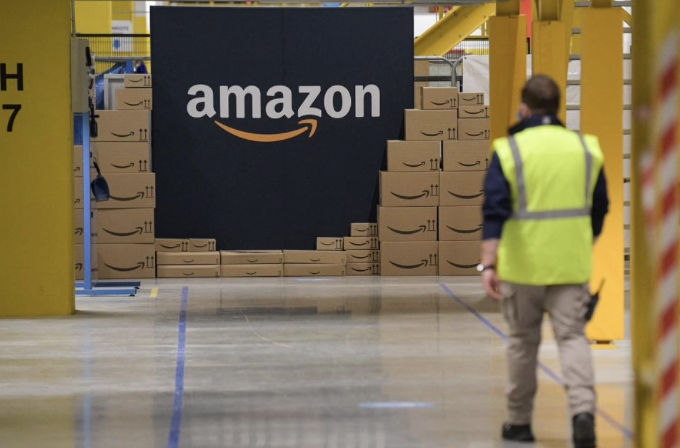Will RFID Help Loosen Amazon’s Grip On Retail?
Amazon can't be happy about Walmart’s decision to dramatically expand the use of RFID in its fleet of stores. Here’s why.
An US giant Amazon employee passes by its logo on the opening day of the new distribution center in Augny, eastern France, on September 23, 2021. (Photo by SEBASTIEN BOZON / AFP) (Photo by SEBASTIEN BOZON/AFP via Getty Images)
AFP VIA GETTY IMAGES
Retailers typically struggle to maintain an accurate view of the precise inventory holdings of each of their stores. This is a huge problem in some merchandise categories, and less so in others. For companies with large store fleets, this has traditionally been treated as a cost of doing business.
Brick and mortar retailers also struggle to effectively manage —- and in some cases even find —- the inventory residing in their stores. This too has been shrugged off as a cost of doing business. And let’s not forget another chronic drain on profit. Theft of store inventory by organized criminals, petty shoplifters, and dishonest employees.
RFID is already helping Walmart fix these issues in several General Merchandise categories (Apparel, Footwear, Sunglasses, Watches, Jewelry) with more now on their way. Elevating inventory accuracy and visibility benefits Walmart’s e-commerce business too, not merely the stores.
Simply put, some longstanding advantages enjoyed by Amazon over Walmart are in the process of being diminished.
What will hurt Amazon even more is if other competitors similarly begin leaning harder on RFID. Or in the case of retailers like Kohl’s, who are quite late to this party, simply begin leaning.
Let’s examine a few of these companies in more detail.
Target
Around 2017 Brian Cornell and the Target team exhibited tremendous foresight (and a high RFIQ) when they decided to begin using RFID in all “soft” Home Goods categories, and not merely use it in Apparel and Footwear.
Target is known to have also begun using RFID on its Heyday brand of Consumer Electronic accessories in recent years, and perhaps on other products too.
It’s fair to say that an expansion of Target’s program into additional categories is long overdue. And it’s possible this expansion is already underway. The obvious questions are this:
1. By January 2023, in which merchandise categories will Walmart be using RFID and Target not?
2. Has Walmart’s category expansion accelerated, or is it likely to accelerate, Target’s plans to use RFID in these categories?
Bed Bath & Beyond
Walmart sells many of the same types of products typically carried by BBBY. But the latter generally carries higher priced merchandise, making Walmart merely an indirect competitor. But the same can’t be said of Target and Macy’s, both of whom have been using RFID for years in many of BBBY’s core categories. Nor can it be said of Nordstrom, Nordstrom Rack, Belk, and Dillard’s, who have begun doing so too.
To what degree will Walmart’s category expansion accelerate the upgrade of BBBY’s “store level” inventory management capabilities?
Best Buy
There is an opportunity here for significant coopetition, defined by Oxford as “collaboration between business competitors, in the hope of mutually beneficial results”. Best Buy and Walmart both stand to gain tremendously if they —- and other retailers with large Consumer Electronics businesses —- step up their coordination with big global brands like Samsung, LG, Sony, and Apple. Industry standards organization GS1 will continue to play an important role facilitating those discussions.
So, it begs the question. Now that Walmart has joined the list of retailers using RFID to manage Wireless and Electronics inventory, will Best Buy’s leadership team elevate Store Level Inventory Accuracy as a strategic priority?
The Bottom Line
The longer it takes retailers to fix the inventory management issues in their stores, the longer Amazon will keep laughing all the way to the bank.

